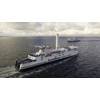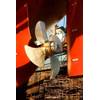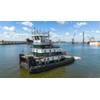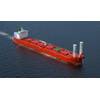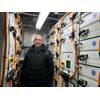Wind Propulsion: Kite System Trialed on Transatlantic Voyage
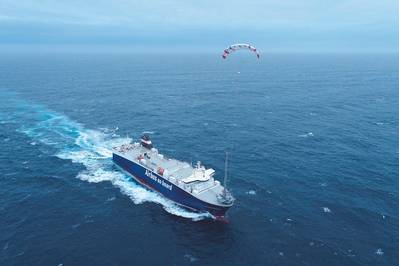
Seawing flying at a height of 200 meters from Louis Dreyfus Armateurs’ vessel Ville de Bordeaux. 250m2 version pictured – 500m2 version is also onboard (Photo: Airseas).
An innovative kite system is being put through its paces on board a cargo ship crossing the Atlantic as wind propulsion takes off for commercial shipping as a means to reduce fuel burn and harmful environmental emissions.
The system, called Seawing, has been developed by France-based Airseas, and is currently being trialed on the 154-meter ro-ro vessel Ville de Bordeaux, which is operated by Louis Dreyfus Armateurs (LDA) and chartered by Airbus, Airseas' minority shareholder and launch customer.
As the ship transports aircraft components between Europe and the United States, a team of Airseas engineers is on board to test the system and gather data, with the operational support of LDA’s crew and Airbus’ Transport & Logistics department.
Footage released by Airseas shows the Seawing system in action, flying 200 meters above sea level, harnessing the power of the wind to propel the vessel and reduce the main engine load.
Vincent Bernatets, CEO of Airseas, said, “Seeing the Seawing in action on a commercial vessel is such a proud moment for us, and the culmination of years of meticulous research and development. Testing a brand new technology in real-life conditions and while respecting the operational constraints of a commercial ship is an ambitious endeavor, and the solid progress of our sea trials is a testimony to the dedication of our team of engineers on board and on shore.”
Antoine Person, Corporate Secretary of Louis Dreyfus Armateurs, said, “We are committed to playing an active role in reducing shipping’s carbon emissions, starting now. We are proud to be associated with this project as a supplier and partner of Airbus, working for the success of this innovative wind propulsion solution alongside Airseas.”
The first stages of the sea trials have validated key steps such as the folding and unfolding of the wing, take-off and landing, and flights in altitude, Airseas said. The next phase will test the Seawing in a broader range of weather conditions and fine-tune the automation system.
“With these strong initial results, we’re more determined than ever to keep testing the system and collecting data, and accelerate our mission to scale up and rapidly deploy wind propulsion technology on vessels around the world,” Bernatets said. “Immediate action is needed to tackle climate change and shipping’s impact on GHG emissions; we are proud to have a solution that can help ships reduce their emissions right now, and accelerate the decarbonization of the maritime sector over the coming years.”
According to Airseas, Seawing can be installed on virtually any type of commercial vessel and promises reductions in fuel consumption and emissions by an average of 20%.
In addition to the first system on the Ville de Bordeaux for Airbus, Airseas has also received firm orders from K Line, a Japanese shipowner who owns the fifth largest fleet worldwide, for five Seawing systems, with additional options to equip up to 51 vessels in total.
Airseas’ Seawing is one of several wind propulsion technologies being implemented in the maritime industry today as the sector—responsible for nearly 3% of global GHG emissions—seeks ways to reduce its environmental footprint.
In September this year, large commercial vessels featuring wind-assisted propulsion passed the mark of one million dwt cargo carrying capacity. There are currently 21 large vessels with wind propulsion systems installed onboard and that number is likely to double over the next 12 months, according to the International Windship Association (IWSA).


